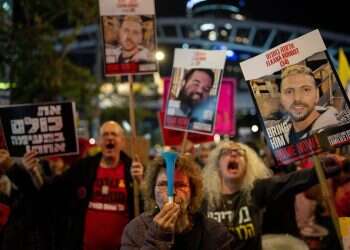The rockets launched at Israel from Lebanon, Wednesday, intensified the dilemma Jerusalem faces regarding the continuation of this recent cycle of fighting with the Gaza Strip. The interconnectedness of the different fronts and concerns of a flare-up on the northern border, alongside increased diplomatic pressure on Israel, has emboldened those voices calling for a speedy conclusion to Operation Guardian of the Walls.
Follow Israel Hayom on Facebook and Twitter
While US Prime Minister Benjamin Netanyahu may have responded to US President Joe Biden's calls for a significant de-escalation in fighting by saying Israel would continue to strike terrorist targets as long as necessary, many senior security officials believe Jerusalem has already achieved its objectives: It has caused significant damage to Hamas' tunnel system as well as the terrorist group's efforts to strengthen its military prowess.
Israel is concerned things could go awry, whether as a result of an airstrike that causes mass Palestinian casualties or a mass casualty attack in Israel. On the other hand, there would be one clear advantage to prolonging the operation: It would increase Israel's chances of taking out one of Hamas' top three officials: Yahya Sinwar, Mohammed Deif, or Marwan Issa.
In closed talks between IDF and security officials, senior officers said Israel could and should bring the operation to a close, as it remains unclear whether Israel will have the intelligence necessary to assassinate any of the three in the coming days.
"There's no doubt it would be advisable to kill them, but we can do it two weeks after the operation ends as well. That would be worth the price of renewing the fighting for a couple of days. If Sinwar or Deif want to avoid that, they should live underground like [Hezbollah leader Hasssan] Nasrallah," one official said.
It remains unclear whether Israel will act on this threat. While Jerusalem has had quite a few opportunities to take out senior Hamas leaders in the past, it has avoided taking action to avoid a conflagration. Israel will face the same dilemma in the future: the temptation of exacting revenge on our bitter enemies versus the possibility of an escalation in fighting Israel will be responsible for and is unlikely to receive international legitimacy.
Efforts to reach a ceasefire deal, in particular through Egyptian mediation, intensified, Wednesday. In the past, Egypt offered both sides to hold their fire at an agreed-upon time, and all the other details were ironed out once the fighting had ceased. The Israeli officials involved in talks with Cairo all work with National Security Adviser Meir Ben-Shabbat, and they have vast experience with Egyptian-mediated indirect talks with Hamas. On Tuesday night, officials with knowledge of the talks said a ceasefire was "within reach."
There is growing support among members of the defense echelon for a ceasefire, in particular given recent events in the north. While the four rockets launched at Israel from southern Lebanon may not have incurred any casualties or caused damage – two landed in the sea, one landed in a field, and a fourth was intercepted – this was nevertheless a serious event. Following two rocket launches and two instances in which Lebanese broke through the Israeli border in the area of Metula, this was also the fifth such incident in under a week.
Hezbollah-approved fire
While all of these events may have been the work of Palestinians who identify with Hamas' struggle in Gaza, it is doubtful they all could have been carried out without Hezbollah's explicit approval. The previous rocket fire on Misgav Am was launched from Shebaa Farms, which is entirely under Hezbollah's control. This is also true of Wednesday's rocket fire on Israel, which was launched from a Shiite area under the Lebanese terrorist group's control.
It's doubtful this series of events is proof of Hezbollah's desire to launch a campaign against Israel. Hezbollah seems to be interested in placating the Palestinians and is happy to embarrass Israel while they're at it. Still, Hezbollah is playing a dangerous game. Should the next incident lead to casualties, the Israel Defense Forces would need to respond with greater force than it did on Wednesday, when it fired 16 artillery shells at the area where the rockets were launched.
Although Israel's relatively weak response could portray weakness, the IDF's Northern Command was right to avoid an escalation. Diplomatic patience with Israel is starting to wear thin, and Israel has no interest in getting dragged into another military campaign that could set the entire region on fire. Nevertheless, Israel would be wise to exact a price from Hezbollah soon. There will be plenty of opportunities to this end, whether in Syria or on Lebanese soil.
Should the fighting in Gaza now come to an end, this would allow the IDF to focus on calming tensions in Judea and Samaria and the Israel Police to complete its activity in mixed Jewish-Arab cities. In due course, agreements will be signed. In a nutshell, the IDF can be pleased with its military achievements, but it is doubtful Israel can claim it won the entire round. Hamas has made quite a few gains, and the events in the north and Judea and Samaria are proof the terrorist group has gained quite a bit of sympathy. The day after, Israel will need to act to restore it to its natural dimensions, to ensure it doesn't go wild once again.
Subscribe to Israel Hayom's daily newsletter and never miss our top stories!




